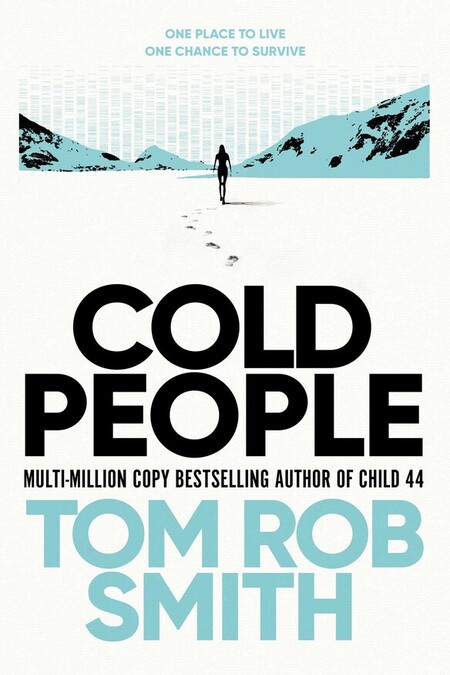There is a log and stories tradition of aliens invading Earth.
Regardless of the medium, they usually arrive in the skies above our blue ball of life, an armada of advanced technology in terrifyingly awe inspiring form, and variously proceed to attack/enslave/pretend to help while secretly destroying us.
It’s big, epic and without any real subtlety, and for the purposes of vicarious sci-fi storytelling, just what the blue-skinned alien doctor ordered; there are, however, some alien invasions which proceed without a great deal of the scary melodrama of the norm, and among them is the one in Cold People by Tom Rob Smith.
In this artfully written novel, which has the most nuanced and immersive slow building of all lead-ups to an extraterrestrial invasion fleet appearing in our skies, the unwanted new rulers of the planet arrive and immediately commandeer all forms of communication, even the defunct, unplugged-in and unpowered kind, to announce that humanity has 30 days to reach Antarctica.
It is the only place they will be allowed to live on Earth going forward, and while no further information, threats or explanation are given, it becomes clear to everyone that they have to get to ice continent or things won’t go well for them indeed.
It is chilling (quite literally, in fact) and terrifying, upending and destroying life as everyone knows it in one frightening broadcast and it is, quite possibly, one of the best opening to any alien invasion ever.
For a moment it was if the whole sky was full of campfire embers that swirled among seagulls distressed at the commotion but otherwise unharmed. And then the beaches were empty, the parks were empty, the freeway and pier were empty, the seagulls were calm again and the only people left alive on the planety were those who had reached Antartica.
It also comes loaded with all kinds of questions and existential dilemmas.
Who do you save and how? Just the rich people? The scientists? The hairdressers (old Douglas Adams joke there)? And in an instant where modes of transport, from oil tankers to planes, become worth their weight in people-carrying gold, are all bets off?
In other words, is humanity going to pull together, Independence Day-wise or simply fight it out to reach Antarctica in time or simply scrap over every piece of ice and rock?
It’s a little of the former, more of the latter, and it underscores in harrowing but compulsively readable detail what it would be like to be holidaying in Portugal one moment and on the run the next (which is what happens to one central character, Liza) and having to compete, Darwinian-style, with a mass of people all intending to reach the one place of sanctuary we have been given before the deadline runs out.
As explorations of the many cruelties and worth attributes of the human condition is concerned, Cold People is brilliantly unnerving, reminding us that no matter how much we might laud our shared civilisational greatness and collective humanity, that it can all be gone in an instant – though in the story, it reasserts itself out of sheer necessity later on – and it’s down to each person to make a difference, either just for the themselves (sadly all too common in the book) or for others.

If you’re expecting Cold People to be just another pulpy alien invasion story, think again.
It is, in fact, intelligently thoughtful and empathetically intense, a story of invasion that focuses on the way in which the dispossessed and the lost have both petty selfishness and lofty altruism in their grasp, and how they reach for both with firm intention, often in the same instance.
The novel also rather cleverly examines, in a story where the aliens are genocidal villains who are never heard from directly which only amplifies their global nightmarish presence and its deadly effect, what humanity might do next after the end of everything.
Well, everything known at least.
Clearly, survival in the icy wastes of what is officially a desert would be a huge challenge, and after the little of humanity that makes it to Antarctica by the deadline has taken stock, it becomes apparent that long-term survival is going to require more than a fishing fleet and a handy way with turning old planes and tankers into cobbled-together housing.
So great are the obstacles to humanity making a go of it that whatever we do next is going to need to be daring, big and hopefully not doom us all with its reckless ingenuity which is, without giving anything away, precisely what happens.
The genius of Cold People, which is enthrallingly, excitingly epic in its scope like the very best blockbuster while possessing an intimacy of humanity that makes you care deeply about what’s happening to certain characters in particular and people as a whole, is that it imaginatively ponders what a post-rush to sanctuary society might look like.
Yotam smiled. He liked Zariffa and wondered why he hadn’t come to her movie screenings. He needed to find a better sense of balance in his life. He was working too much. In trying to save people, he’d forgotten how much he enjoyed their company.
‘What are you doing right now?’
The good news is that some eight million of us survive somehow, both the alien-induced exodus from warmer climes and the resultant scrabble for resources that follows; the bad news is that we make some very bad decisions in the aftermath, proving that our ability to damn ourselves while trying to also save our collective whole is breathtaking in its certainty and simultaneously inspiring and dispiriting.
Tom Rob Smith does an impressive job of discussing a metric ton of weighty concepts and going deep into what powers and sustains as a species, as well as where our joint Achilles Heels might lie, in a novel that always feels like a blockbuster story without the moralistic core of an indie piece of storytelling.
It’s like Independence Day meets The Whale, all big, bold and epic yet so intensely human and real and willing to go hard and deep into the pitfalls and elevatory qualities of being human that you are marvelling at its exciting expansiveness as you are nodding knowingly as its capacity to lay our collective soul bare for unstinting scrutiny.
Ut is, quite simply, the best alien invasion story to come along in a while, a reminder that though we dream of good and lofty things and talk of them in words-kissed-by-gods terms, that we are selfish and shortsighted too and that if the worst was ever to happen, we would both plunge the dagger in while trying to heal the wound, a cross-purposes of survivalist intent that is brilliant to read about in any setting but even more so when our back as a species is up against an (icy) wall and nothing is certain any longer (if, to be fair, it ever was.)
